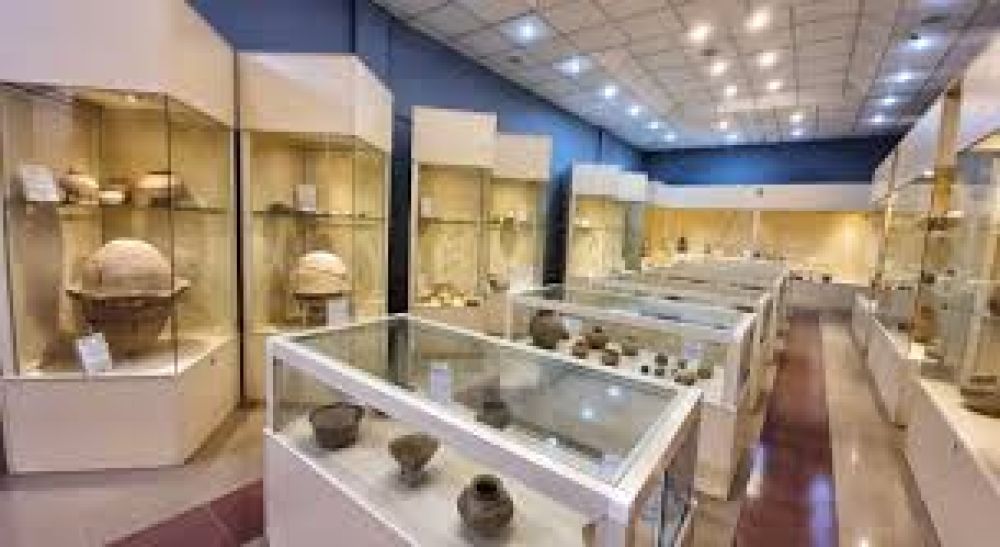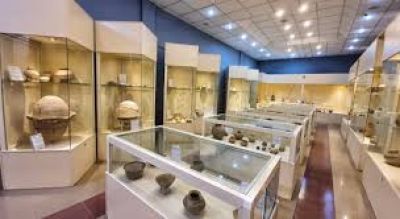

The Erbil Civilization Museum houses an impressive collection that walks visitors through the rich history of the region. The Prehistoric Hall is a journey back in time to the earliest human settlements. Here, you will see artifacts from the Paleolithic, Neolithic, and Chalcolithic periods, giving insights into the lives of hunter-gatherers and the first farmers of Mesopotamia. The displays include ancient pottery, tools, and weapons, as well as explanatory panels that describe the transition from nomadic lifestyles to settled communities. This exhibition provides a fundamental understanding of human evolution and the birth of civilization in the cradle of civilization itself.
The Erbil Civilization Museum is home to a fascinating collection of the region's ancient scripts and coins. Visitors will discover an array of cuneiform tablets, which are among the earliest known forms of writing, dating back to the Sumerian period. These clay tablets are etched with wedge-shaped characters and tell a tale of the ancient administrative, economic, and literary practices. Adjacent to these are displays of coins from various historical eras, showing the evolution of currency in Mesopotamia. These coins are significant as they reflect the art, economy, and political history of the region. Each piece is intricately detailed, and the exhibition educates visitors on the minting processes and historical context.
One of the highlights of the Erbil Civilization Museum is its extensive collection of artifacts from the mighty Assyrian Empire. As visitors step into this exhibit, they are greeted by sculptures, bas-reliefs, and inscriptions that once adorned the palaces and temples of ancient Assyria. The craftsmanship and attention to detail on these relics are astounding, offering a glimpse into the world of Assyrian kings, warriors, and their daily lives. The descriptions next to each piece provide context, allowing guests to better understand the dominance and influence of the Assyrian civilization in the region. This exhibit unveils the profound impact of this empire on the course of history in the Middle East.
The Islamic Era Exhibition in the Erbil Civilization Museum is a testament to the region's significance during the Islamic Golden Age. This hall showcases a wide array of Islamic art and culture through artifacts such as manuscripts, ceramics, textiles, and metalwork from different Islamic periods. Notably, the exhibition includes beautifully crafted calligraphy, which is central to Islamic art and conveys the spiritual and philosophical depth of Islamic culture. Visitors will also learn about the scientific advances of the era through displays of astrolabes, medical instruments, and historic maps, painting a picture of an intellectually rich and diverse period in Middle Eastern history.
Dedicated to the history and culture of the Kurdish people, the Gallery of Traditional Kurdish Life at the Erbil Civilization Museum presents an intimate portrayal of the customs and traditions of Kurdish society. Visitors can view a collection of clothing, jewelry, musical instruments, and everyday household items used by the Kurds throughout history. This exhibit also includes a reconstructed village scene with life-size dioramas illustrating the rural Kurdish lifestyle, complete with traditional homes, farming tools, and a glimpse into the vibrant communal practices. This gallery is an educational and cultural homage to the Kurdish heritage that is integral to the area's history.
As visitors continue their journey through the Erbil Civilization Museum, they encounter a collection showcasing the influence of the Ottoman Empire in the region. This gallery presents an array of weaponry, clothing, and official documents that date back to the time when Erbil was under Ottoman rule. The memorabilia displayed provides a fascinating insight into the military, governance, and lifestyle during the Ottoman period. The exhibition includes detailed descriptions in both English and Arabic, inviting guests to explore the rich tapestry of Ottoman history and its impact on the culture and architecture of Erbil.
One of the informative sections of the Erbil Civilization Museum focuses on the ancient agricultural techniques and trade systems that were developed in Mesopotamia. This part of the museum features tools used in farming, models of irrigation systems, and maps illustrating trade routes that were instrumental in the economic development of the region. Artifacts including weights, measures, and examples of goods traded, such as grains and textiles, are on display. Detailed explanations provide context to these items, highlighting how ancient Mesopotamians successfully managed surplus production and created a thriving trade network—contributing to the rise of urban societies in the area.
The Erbil Civilization Museum is not only a place to admire ancient artifacts; it also provides education on archeological methods. This activity includes a walkthrough of a section dedicated to the discipline of archeology, where visitors can learn about the tools and techniques used in excavations. The exhibit demonstrates how archaeological teams work to uncover, preserve, and study the ancient treasures buried beneath the earth. Videos and interactive displays allow guests to gain a deeper understanding of the meticulous process of fieldwork and the challenges archeologists face while trying to reconstruct history. This can be an eye-opening experience for those curious about the process of bringing history to light.
The Erbil Civilization Museum occasionally offers cultural workshops and crafts sessions designed to engage visitors in the traditional arts and craftsmanship of the region. These workshops could include activities such as pottery-making, traditional painting, or calligraphy, offering hands-on experience in creating art inspired by the museum's collections. Led by local artisans and craftsmen, participants get the chance to make their own keepsakes and learn about the historical significance of the materials and techniques used. The workshops aim to keep ancient traditions alive by passing them on to new generations and visitors from around the world.
For those interested in experiencing history through visual storytelling, the Erbil Civilization Museum occasionally screens historical documentaries and films. These viewings provide context and background on the vast historical epochs that the artifacts in the museum represent. Through these screenings, visitors can delve deeper into the stories of Mesopotamian civilization, the Assyrian Empire, the rise of Islam, Kurdish life, and much more. The documentaries are well-researched and often include interviews with historians, reenactments, and 3D renderings that bring the past to life. Be sure to check the museum schedule for screenings times and any special film events.
